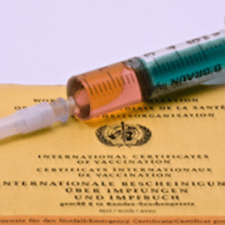
Since October 2012, five serious cases of meningococcal disease in gay men have been registered in Berlin. The bacteria can cause meningitis and septicaemia. Three men have already died and one is in a coma. The Berlin Senate Department for Health and Social Affairs has now issued a Vaccination recommendation for all men living in Berlin who have sex with men (Message on aidshilfe.de). Axel Schock spoke about this with Dr Ulrich Marcus from the Robert Koch Institute:
Dr Marcus, the number of cases of the disease is manageable, yet they have attracted a great deal of attention. Why is that?
Because of these five patients, three have died and one is in a coma. So we are dealing with very serious illnesses here. But in principle, there is a vaccination that can prevent the disease.
How threatening is the situation?
There is no evidence to suggest that we are at the beginning of a new epidemic that will now spread rapidly. It would probably remain a manageable number of cases even if we did nothing now. But, as I said, these are potentially fatal diseases that are relatively difficult to protect against individually. It is therefore important to better understand what is actually happening, i.e. who is actually at risk, and to vaccinate in good time.
Not all people who are carriers of meningococcus contract the disease.
Correct. There are a very large number of symptom-free carriers in whom the meningococci mainly colonise the mucous membranes of the nose and throat but do not cause disease. Only a small fraction of people who come into contact with meningococci develop a disease.

Obviously, gay men fall ill more frequently than average.
The reason for this is still a mystery. Meningococcal disease is basically nothing new. It's a little strange that it's only now that such a high incidence of the disease among gay men is being noticed. It is possible that this connection was simply overlooked in previous cases of meningococcal disease. In the case of the five current cases in Berlin, this has only been recognised because two cases are directly related.
To be able to better estimate this number: How many cases of meningococcal disease occur on average in Germany?
On average, there is one per day, of which only ten per cent are severe. The disease peaks in infants and adolescents. Adults rarely contract meningococcal disease. Most people who come into contact with the bacteria probably develop an immunity over the course of their lives that protects them from contracting the disease.
In previous meningococcal outbreaks in Toronto in 2001 and in New York from 2010 to 2013, gay men were specifically vaccinated to prevent the spread of the disease. Did this strategy work?
This is very difficult to estimate because the number of cases within these local clusters is too low. In New York, there were no more than 22 cases within two years. Until we know more precisely what these clusters are really due to, it is impossible to say whether these vaccination campaigns have actually helped. It is possible that the spread would have stopped on its own or paused.
The Berlin Senate Department for Health and Social Affairs now also recommends that sexually active gay men in the city be vaccinated against meningococcal disease. Could the public be under the misguided impression that gays are spreading a new threatening epidemic among the population?
"I don't see a real risk of infection for the population"
I don't see any real risk of infection for the population. So far, there is no evidence that meningococcal disease is spreading from within the gay community. However, I do see a risk of stigmatisation if the meningococcal outbreak is picked up by the media in a sensationalist way and any half-truths are spread.
The vaccination phase should last until 31 January 2014, why this deadline?
In addition to sporadic individual cases that occur from time to time, there are usually smaller clusters or outbreaks in which several directly related people fall ill. People in their neighbourhood are vaccinated in an attempt to prevent further cases. These are, of course, temporary campaigns. However, the meningococcal outbreaks that we have seen in the gay community in recent years have a slightly different character. They are obviously not so limited in time and not restricted to a very narrow group of people. This is a slightly different pattern of spread. So I don't know whether this phenomenon can really only be countered with a time-limited vaccination recommendation.
So could it be appropriate for all sexually active gay men to be vaccinated against meningococcal disease, as is recommended for hepatitis A and B?
It may come down to that. Although I'm not sure whether older sexually active gay men are actually particularly at risk - unless their immune system is weakened by an HIV infection. For me, it is striking that all of those infected in Berlin were young men. This suggests to me that it is not necessarily sexually active men who are at higher risk, but perhaps those who are just entering the scene and have not yet had the opportunity to develop immunity to the bacteria. But that is still speculative at the moment.

That is, there may be co-factors that happen to affect gay men but are primarily sexual in nature?
We know that these meningococci can also be transmitted sexually. We are not yet able to say whether and what role this plays in the disease. There is also evidence that gay men are far more frequently colonised by these bacteria than the average population.
What percentage of the population are carriers of meningococcal bacteria?
To date, there have been very few studies on this question. The percentage is certainly also age-dependent. As part of an investigation into an outbreak of meningitis at a carnival party among young people, we found this type of bacterial colonisation of the nasopharyngeal mucosa in around ten percent of those who were not infected. And in a Slovenian study of young gay men last year, meningococci were found as harmless mucosal colonisers in every second person. I doubt whether such high numbers would also be found in examinations of 40- or 50-year-old men. Perhaps this accumulation is enough to explain why there are more cases of the disease among gay men of all people. I had the opportunity to obtain information on three of the Berlin cases about the patients and the course of the disease. The observations I have made so far do not currently allow me to conclude that the illnesses are due to particularly pronounced sexual risk behaviour.
Dr Marcus, thank you very much for the interview!
DAH information sheet on meningitis (as at 18 July 2013)









